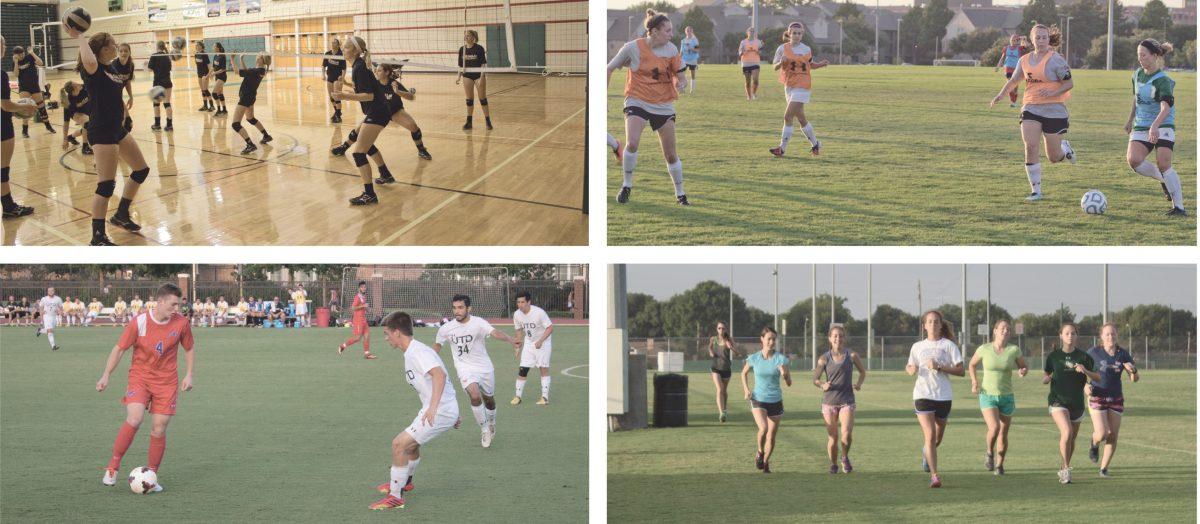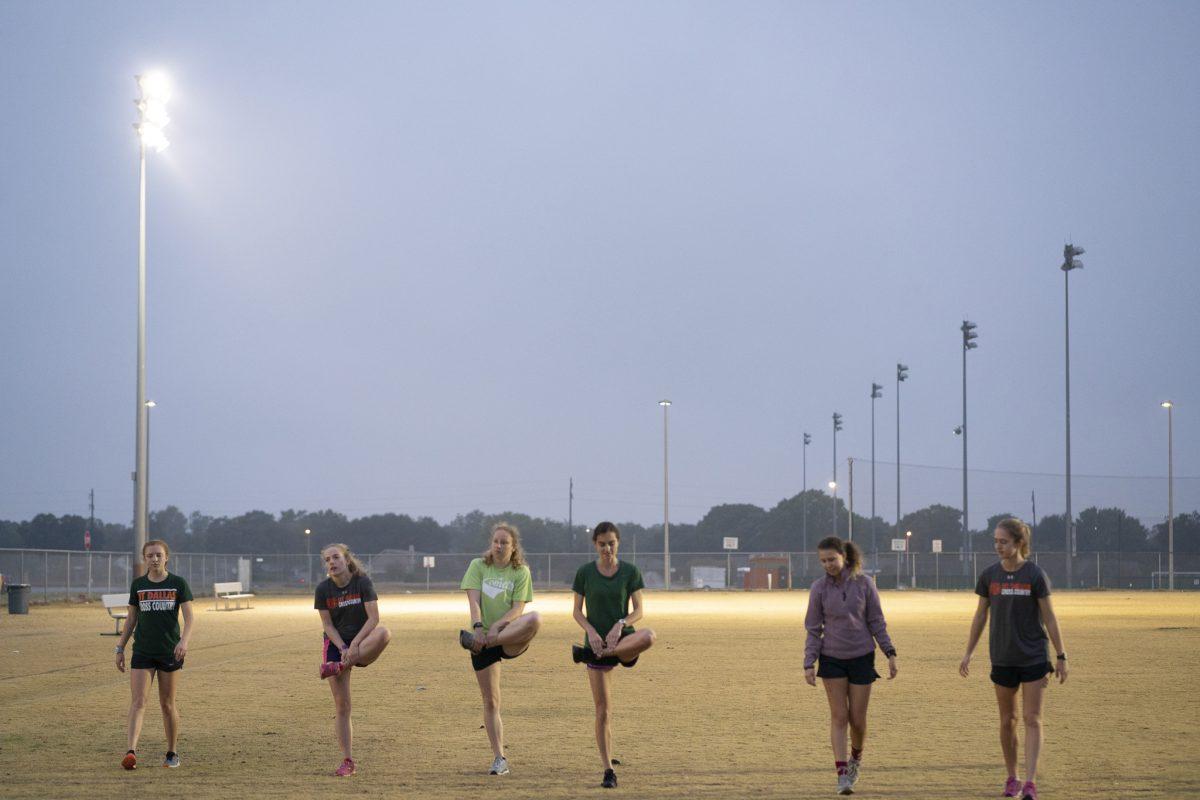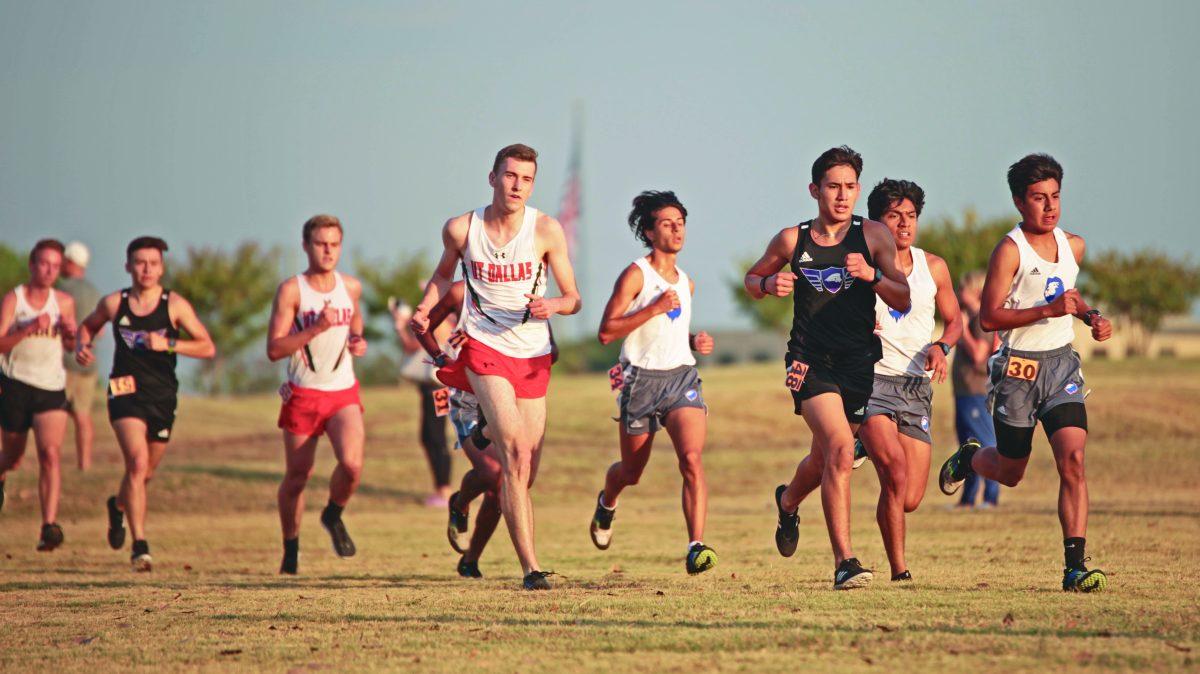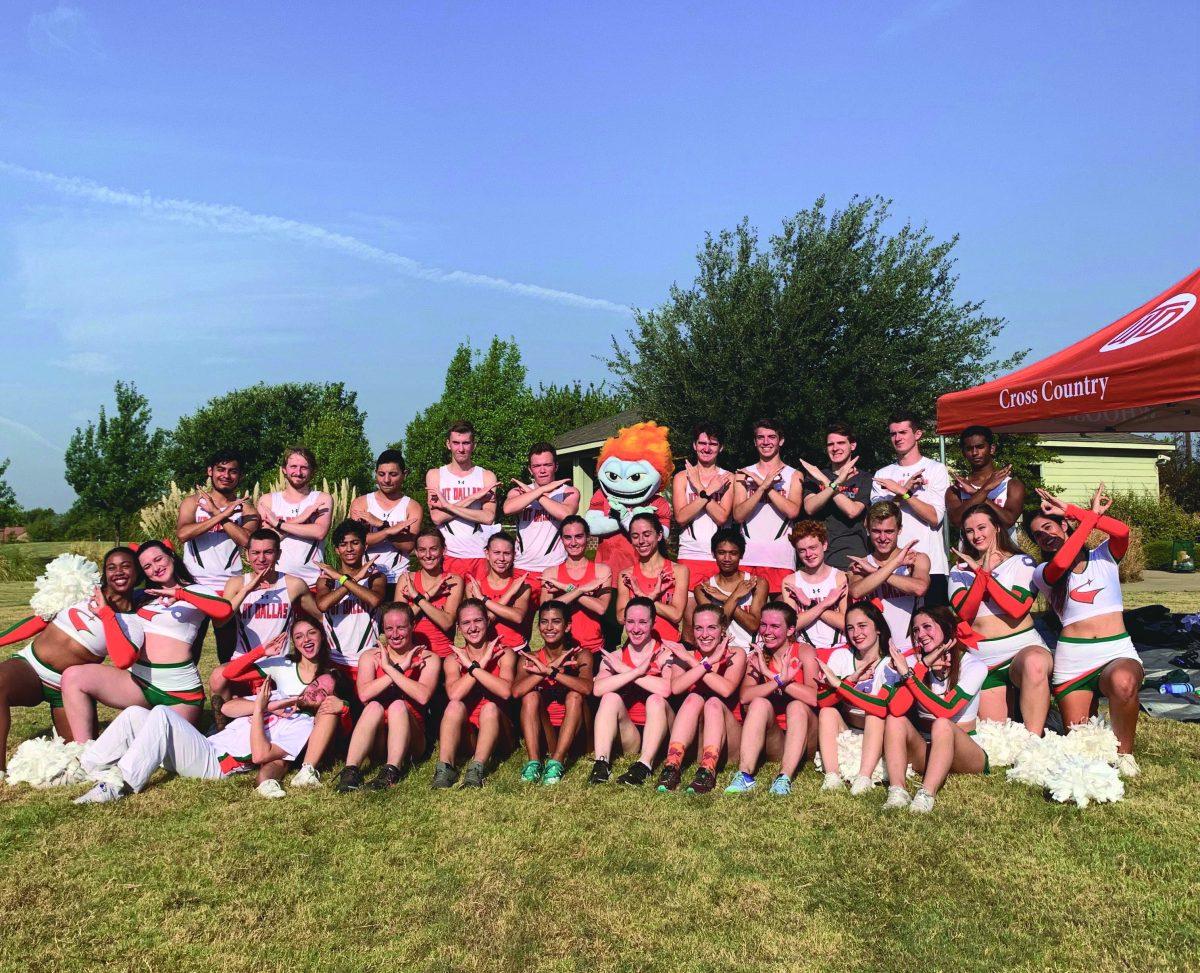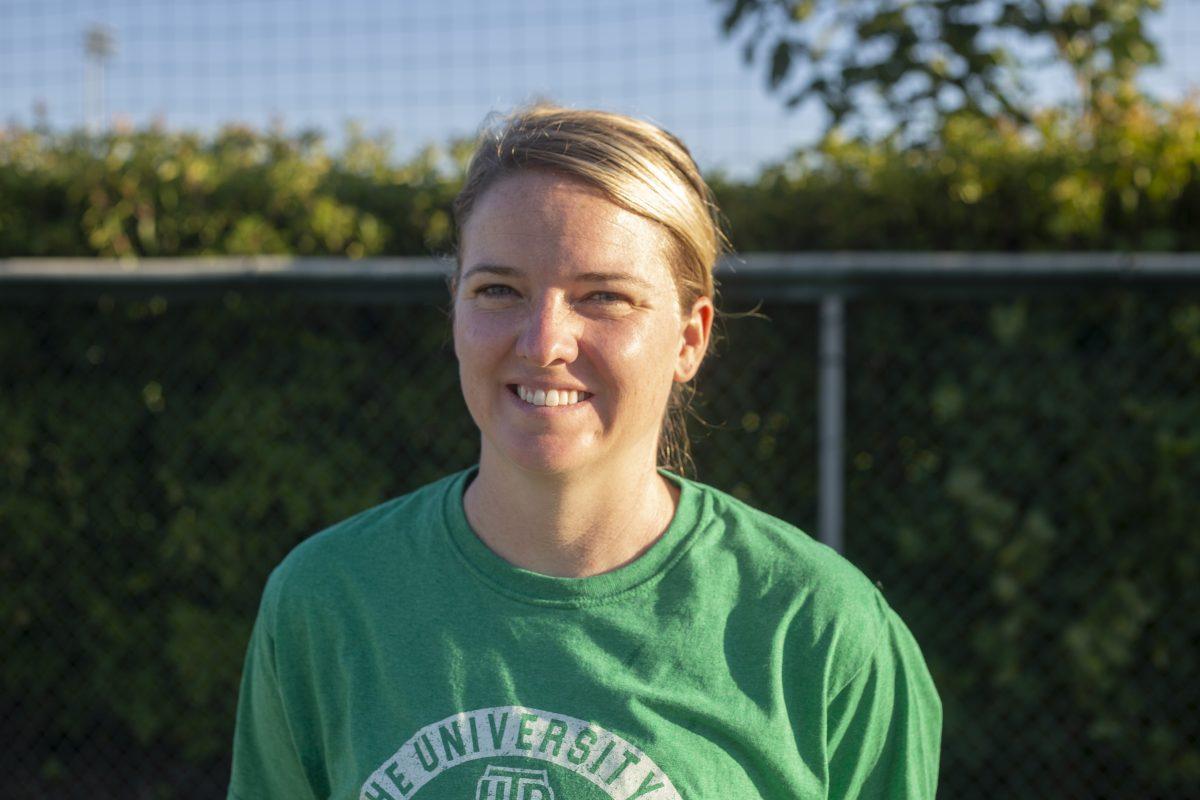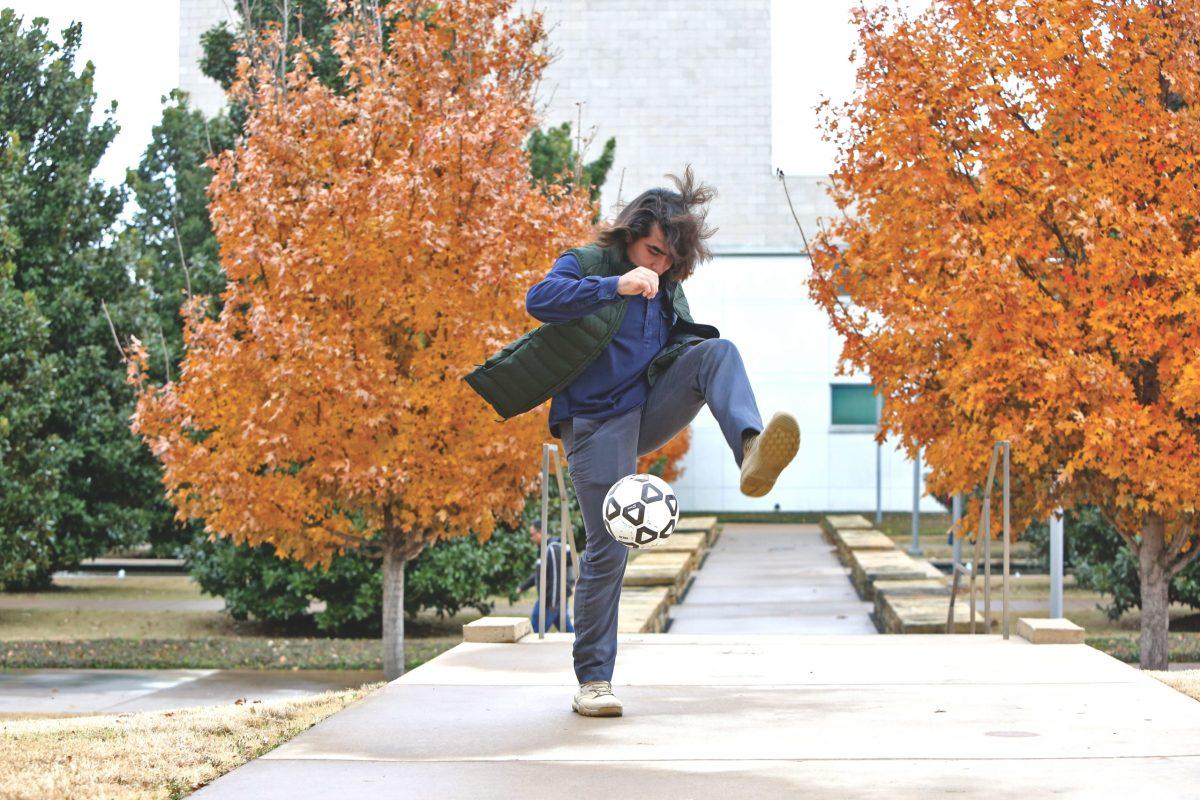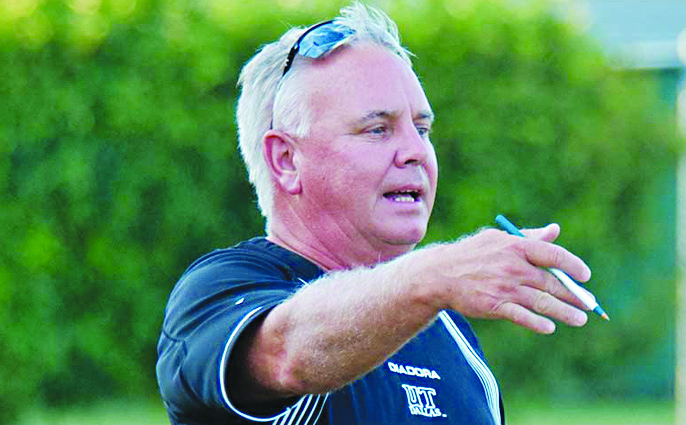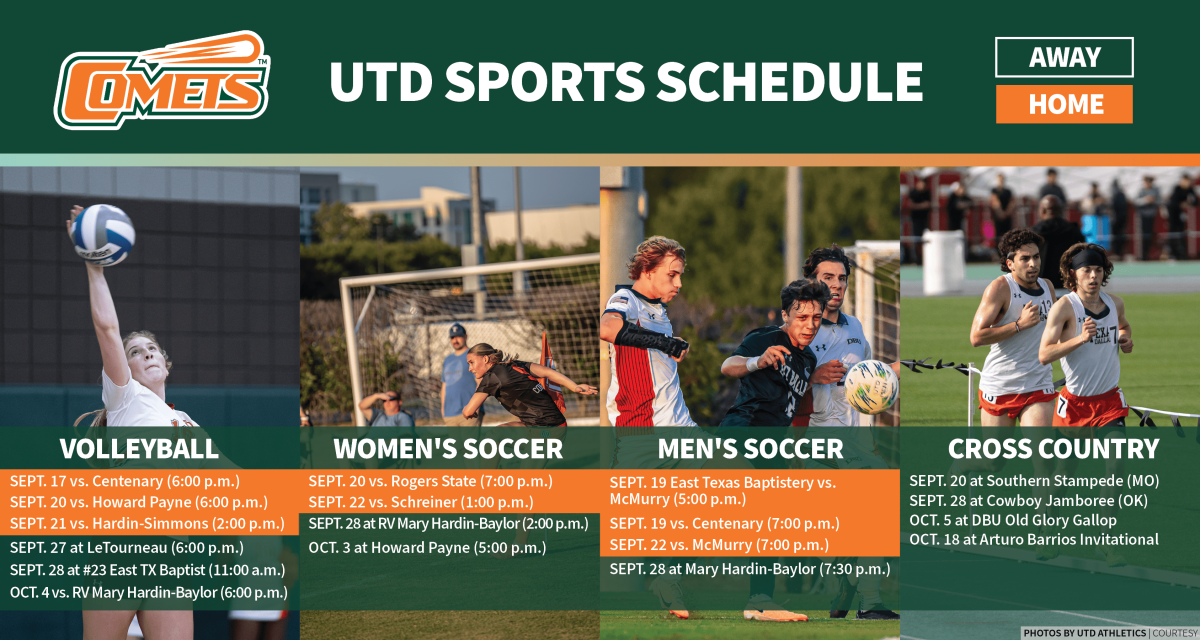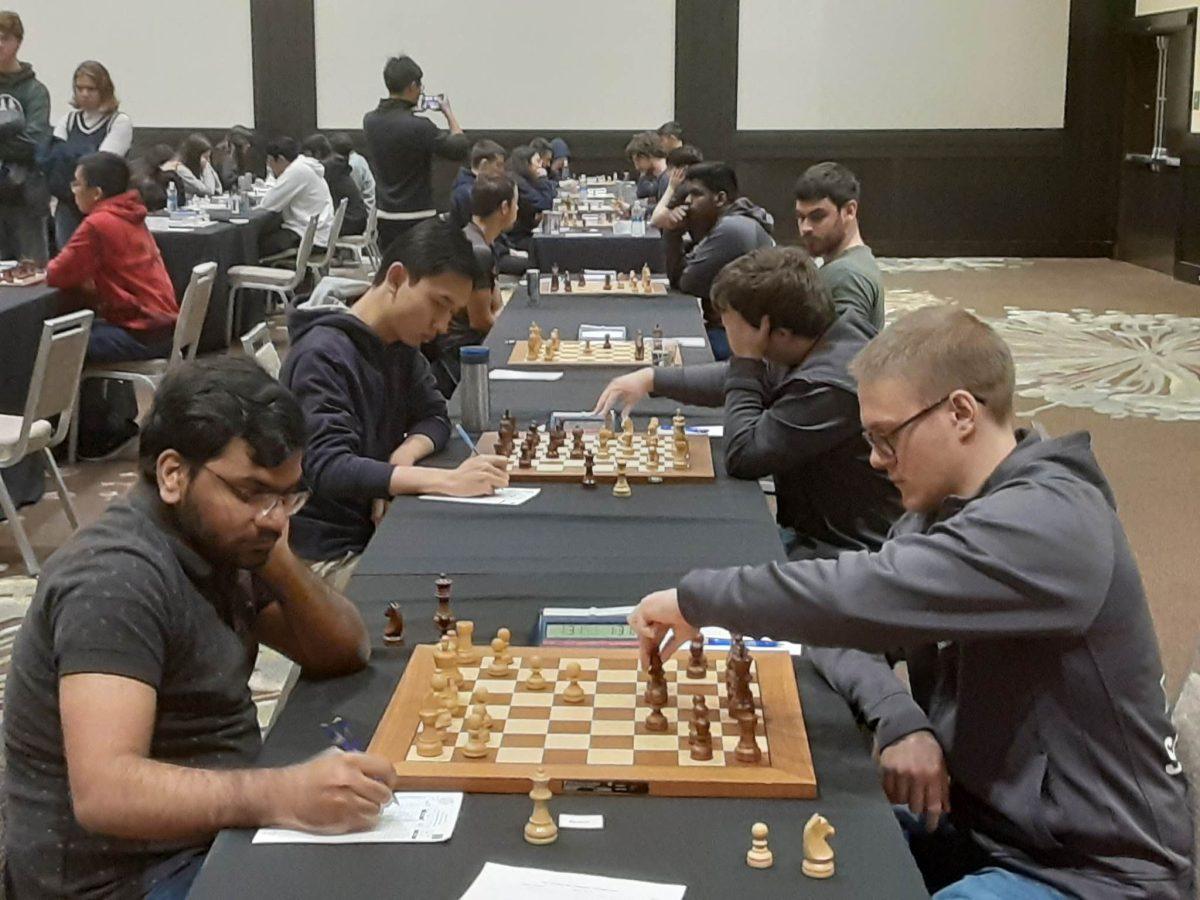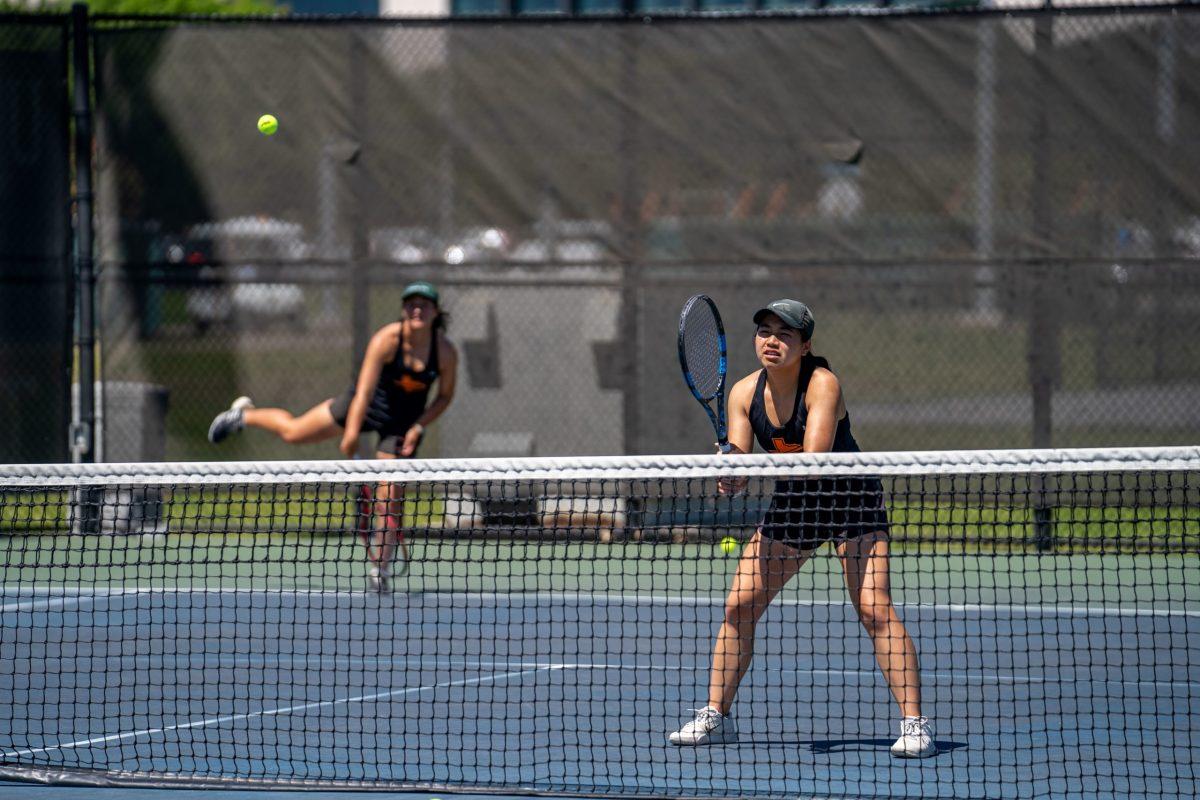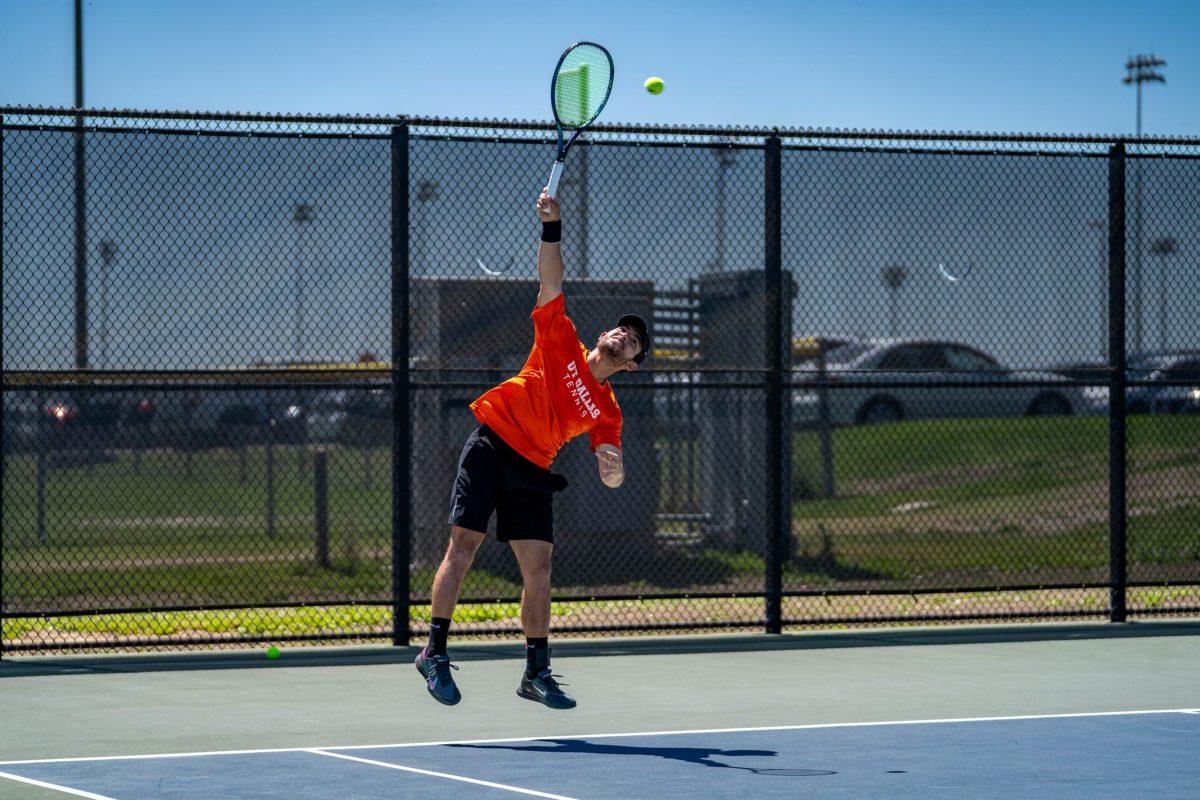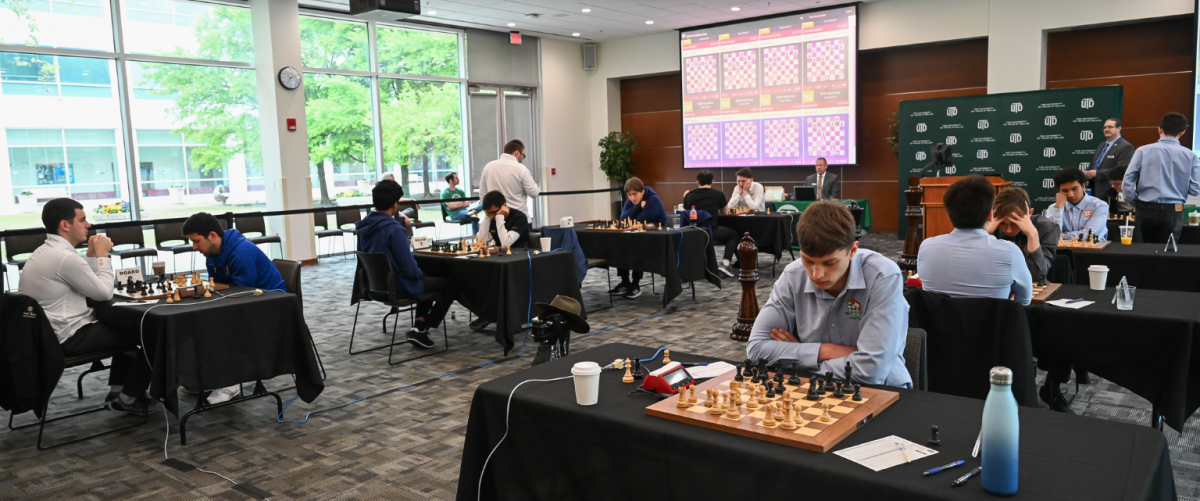Athletes prepare over the break and face tough regimens, early mornings and new changes as they get ready for the year
New era begins for women’s soccer team, coaching staff
Members of the women’s soccer team steadily filed into the Activity Center as the clock struck 7 a.m., some still rubbing the sleep out of their eyes as they prepared for one of the first organized practices of the season.
The team was eager to start the season off on a good note under new head coach Kanute Drugan and seemed to be in a chipper mood as they chattered endlessly amongst themselves, the echoes of their voices bouncing off the walls. The energy in the room was split between the old and the new, with veterans calmly laying back, ready to finally start. Meanwhile, the freshmen nervously eyed the clocks on their cell phones as practice drew near.
Unfortunately, the weather that day seemed to conspire against their aspirations. Lightning illuminated the sky and rain flooded the playing fields. Practice would have to wait.
Drugan waited, uncertain if the skies would clear. It was just another harbinger of the unknown in a season bound to be full of changes.
For Drugan and his squad, the upcoming season presents a myriad of challenges. Drugan brings with him a brand new style of coaching to the program, which had been under the leadership of John Antonisse since its inception in 1997.
“For 16 years it was one style of play,” Drugan said. “Now suddenly, out of nowhere, there’s a whole new style of play. Different formations, different coaching staff, different teaching approach, different expectations, different standards in play. It’s a lot.”
When he started working with the team at the end of the spring semester, things were slow as the team tried to acclimate themselves to his style of play, Drugan said. However, they’ve come a long way in a short amount of time, he said.
When the team finally made it to the pitch at 6 p.m. later that day for its first practice, that unfamiliarity with Drugan’s style reared its head. As they did the first few drills, players seemed confused as to what they were supposed to be doing with the ball and where they were supposed to be.
As the coaching staff patiently took their time with the players and more thoroughly explained the drills, the initial clumsiness quickly dissipated. The ball started to flow more smoothly and crisply as players weaved their way through the four-way-pass drill with relative ease.
The process was made smoother by something rarely seen from most coaches: allowance of suggestions from the players on how to make the drill better.
As Drugan discussed how it was supposed to be done, players chimed in on what they liked and what they thought could be improved upon.
“He’s very big on listening, so if you noticed we’re all listening when he’s talking,” said senior forward Carli Beckett. “Theres’ not a lot of goofing off, but we’re still having fun. The big thing is he’s very committed to teaching us, he makes things easy to understand, on a piece of paper and on the field.”
Drugan has made learning a big part of his one-week camp, with two-hour learning sessions set in between the team’s morning and afternoon practices, where the coaches go over their style of play and formations.
The ability to teach and learn from both the coaches and the team will be crucial for success in the upcoming season. The team went 10-9-1 last season, a record that qualified it for the ASC tournament. Once in, the Comets made it all the way to the championship game, where they lost 1-0 to the then 12th-ranked Hardin-Simmons.
To maintain and surpass that same level of success, Drugan implemented a summer workout program that focused heavily on both the mental and physical aspects of the game. He prepared a 40-page packet detailing workouts for players to do, along with a 14-page booklet that broke down his offense piece by piece.
This type of information proved invaluable to the players as they prepared for the season.
“Our summer packet wasn’t just lift weights or run two miles and run sprints,” said sophomore forward Katherine Civitillo. “It had drills in them, it had certain ways of passing and it had moves to learn that we’re supposed to be able to incorporate, so if we come out here already knowing, it cuts that much of the little drill detail time and more incorporation of the game.”
The average workout took around two hours to do and included everything from long distance running to agility work to drills focused on skill.
As the practice came down to a close, Beckett seemed pleased with the progress the team had made.
“The biggest thing I’m impressed with is that (the younger players) work with us already,” she said. “There’s not a big drop off between them and us, and that’s just a combination of hard work, talent and willingness to learn. It’s crazy because it doesn’t even seem like they’re new.”
Drugan seemed pleased with the teams performance and chemistry.
“All the older girls helped out,” he said. “No one was barking at anybody, no one was making anyone feel put down. Everyone was encouraging and instructing and supportive. That was impressive, too.”
As the team gets ready for the season, their mindset is clear.
“I think this team will go farther than teams previously,” said senior defender Jasmine Chipps. “We have a really strong class of seniors … but more than that we have a solid team, and having a coach behind us that understands and wants to use our strengths and basically get us to be the best team we can be, it’s something new.”
Men’s soccer fights through two-a-days, Division I opponent
The team came to a sudden halt as the shriek of a whistle pierced the late afternoon air, temporarily stopping the drill. You could tell the players had done something wrong.
“Some of you guys, you’re too casual,” said head coach Jason Hirsch. “I’m asking for speed!”
After Hirshch explained how the drill should be done properly, the men’s soccer team got back to its passing exercise with a renewed vigor. It was just another moment in a long, hot practice as the players strained to pick up their feet and meet Hirsch’s demands.
The team prepares to enter the 2014 season with a week of two-a-day practices, with the first practice of the day having a heavier focus on conditioning and the second practice featuring more work on the minute details of the game.
That attention to detail demonstrates one of the more overlooked struggles of athletes: waiting and watching.
The team sat in the unforgiving sun as Hirsch meticulously explained, step by step how he wanted the players to run a drill that dealt with how the team should communicate to get the ball out of the backfield.
Michael Darrow, the program’s all-time leader in goals and a current volunteer coach, said even though it may seem boring, he could guarantee very few schools put that much emphasis on the little details.
As the team members gear up for the season, they look to respond to the heartbreaking finish they had last year. After going 12-1-6 and qualifying for the ASC tournament, they lost in the semifinals to conference rival UT Tyler in penalty kicks.
The team lost some key players from their team last year, including Darrow and goalkeeper Steven Nicknish, who were the ASC offensive and defensive players of the year, respectively.
“Replacing the guys that were productive for us last year, the seniors that have left the team, that’s going to be what we’re looking for straight away,” Hirsch said.
In practices, Hirsch is loud and vocal the entire time, shouting out commands and adjustments. His voice booms and echoes, the use of any megaphone made unnecessary by his volume.
He has to be loud to get his message across to the team during the long week. Coming back for a second practice in the sweltering August heat has a noticeable impact on the players as they sweat and struggle their way through the workout.
“It’s physically exhausting and mentally exhausting as well,” Hirsch said.
The increased effort by the players isn’t lost on the coaching and athletic training staff.
“We’re pretty cautious, obviously, with the heat, from a recovery standpoint, in terms of what we do and the time in between,” said Tom Monagan, head athletic trainer. “We feel like we give them enough rest in between to let the body recover.”
Because of the intense work the team puts in the week before school, its members are expected to put in a substantial amount of time during the summer. Freshman midfielder Daaron McFarling said the workout program focused on more than just what they ran.
“We have to play soccer everyday and run everyday and eat awesomely,” he said.
The focus on nutrition for the team isn’t just during the summer.
Monagan said the coaches and trainers emphasize recovery time. The trainers make sure to have protein shakes and protein recovery bars at the end of each practice for the players.
During the long practices, players and coaches can sometimes become frustrated whenever play and performance devolves into sloppiness. Some members of the team become visibly distraught, something Hirsch feels the need to address to the team afterwards.
“These guys, they’re UTD guys, they’re so smart, and they have a tendency to overthink things,” he said. “That’s all I was trying to tell them. There’s no reason to freak out or panic if something doesn’t go perfectly right; this is our third day … We have a long season ahead of us. We even have a long preseason ahead of us to sort these things out.”
Players have to recover quickly from mental slumps. It was no different in the preseason as UTD faced Richland and SMU two days later.
Unfortunately, that day did not go exactly as the Comets had planned.
It started off with a game Hirsch said he was “very unhappy with” against Richland, which caused the coach to call a meeting to specifically address the team’s performance.
After making some changes to its offensive formations, the team geared up and took the field at SMU’s Wescott field.
Despite the Mustangs weeklong worth of practice time they had on the Comets and their abundance of scholarship players, UTD came out fighting.
“We were in there, especially the first 30 minutes; they had no idea what hit them,” Hirsch said. “We were playing around them, we had control of the game, we were in their half of the field a lot, so that was good to see.”
At half, the score read 0-0 and the team looked optimistic, having held off a seemingly stronger opponent.
As the second half kicked off, that performance began to fade away as SMU took over the game with its size and speed. Despite having several on-goal attempts and a vigorous defense, the Comets lost 0-2.
Despite the loss, Hirsch seemed pleased with the effort of his team and what that boded for the upcoming season.
“The result here doesn’t really matter; this is more about the performance,” he said. “And against a team like SMU, with the athletes and the soccer players that they have, I know of course we want to win, but I’m proud of them.”
As the team looks forward to the season, Hirsch’s goals are more in the present than the future.
“We don’t like to say, ‘at the end of the year, we’re going to do this, this and that,’” he said. “We’d like to put ourselves in a certain position to be successful, but the way we take it is one game at a time.”
V-Ball enters season with great expectations
For the volleyball team, the schedule for preseason practice is different than the other teams on campus.
Rather than having a full week of practices set up for the team, coach Marci Sanders opted for another route, kicking off her team’s practice schedule the Thursday before school started.
Sanders said she did this because the depth she has returning on the roster. With 10 players returning from last year’s squad on the roster, she said she doesn’t feel the need to take as much time to teach as she used to.
This means much of the training and conditioning had to be done by the players.
“Obviously we can’t require anything, but we do provide them with a summer workout,” Sander said. “This year we tried something a little different; we called it the Three C program.”
Three C, which stands for Comet Conditioning Challenge, featured several aspects the players worked on to get ready.
“Our coach gave us a lot of workouts to do,” said junior Bethany Werner. “Things like fitness, agility, sprints, weights, things like that. We also started doing a nutrition log, which is something new that we didn’t do last season, so eating clean, because coming in you want to be in the best shape as possible.”
Werner, who will be a team captain this upcoming season, said the program featured several challenges, some of which were not as traditional as others.
“One of them is a ‘get to know your teammate challenge,’ so we have to come in to the season knowing all of our teammates we were assigned, just like family,” she said.
Players received the name and contact information of two team members. One of the players Werner received was an incoming freshman she had to get to know over the summer break.
“We were given their phone numbers, so we were just kind of texting back and forth getting to know each other,” she said. “I think the thing with that is that our preseason this year is fairly short. We start practice on Thursday and our first games are the following Friday.”
Werner said she thinks getting to know each other beforehand, especially with such a short time period to prepare, will help translate into team chemistry earlier in the season.
That team chemistry will be needed for the Comets to replicate the success they had last season. They went 31-9: the most wins in program history. They also were the regular season conference champions and qualified for the NCAA tournament.
Despite that success, the team failed to make it into the American Volleyball Association Preseason Top 25, missing the vote by two places.
“Of course that is motivation to come out strong from the very beginning and prove that we have been working hard all summer, that we’re in shape, ready to go and we’re going to have a better season,” Werner said.
Junior Kayla Jordan said a major motivator for the team was how they ended the last season.
“We’re very excited and pumped up to win the conference tournament,” she said. “We got first in regular season, and then we kind of fell apart during the tournament. To redeem ourselves would be good and then go on and get farther into the NCAA tournament.”

After winning the most games in program history, the volleyball team enters the season ranked just outside of the American Volleyball Association Preseason Top 25 .
During the few days the team has between the first practice and the start of the semester, they have to endure the hardship of three-a-days.
The first two days, the team had practices from 7-10:30 a.m., 3-6 p.m. ,and 8 to 10 p.m..
Jordan said during three-a-days, the members bond from playing with teammates and seeing how they work with one another on the court.
Sanders, who worked this summer with the national volleyball collegiate team, said she would use tactics she learned from her time there to challenge her team once the year starts.
“I learned some new things, so (assistant coach Zack Villarreal) and I are changing up our responsibilities a little bit,” she said. “There are going to be some different philosophies that we’re bringing into the season as far as who we’re playing when.”
She said she would probably not go with the starters at all times, forcing the team into tough situations.
“Will that cost us some sets? Sure. Will it potentially cost us some matches? Hopefully not,” Sanders said. “But we feel like if we’re losing earlier in the season, then maybe it will prepare us to be better prepared late in the season when those challenges come.”
As the summer draws to a close and the season and school year get closer, Sanders is optimistic about how the preparation her team had put in would pay off.
“I think they worked hard over the summer, so it’s going to be exciting to see how they put the mental pieces together,” she said. “I really feel like we get in our own way sometimes, so hopefully with another year of experience, we’ll stay out of our own way, and we’ll see if the changes that Zack and I are making will pay off in the end or not.”
Cross-country teams rely on self-discipline, motivation to prepare
A typical training day for Steven Baxter starts around 6:30 a.m. The computer science senior, who is starting the final year with the cross-country team, schedules his workouts depending on whether that day is a “hard” or “soft” according to the training regimen given to him by head coach Sean West.
“A hard day is something with repeated high intensity, like 16 400-meter dashes,” Baxter said. “A soft day is something that’s basically like run seven miles or run 10 miles.”
He said the regimen is based on hard days meant to improve running and soft days, which are meant to condition.
For the men’s and women’s cross-country teams, the preparation put into the season is different than every other team entering the school year. Most teams have at least a week before school in which they can get in official practice sessions as a team under the supervision of their coaches. NCAA regulations prohibit the cross-country team, from interacting with their coaches until the first day of school.
Their first meet occurs four days after their first day.
“You’re entirely self-motivated,” Baxter said. “It’s really hard to stay motivated alone.”
Despite the prohibition on official practices, the teams still managed to meet up for workout sessions on their own time. They are allowed to do so as long as no coach or member of the athletic department is involved with the process.
They even met up for one of these sessions the Thursday before school started. Put together by team members via text message, the workouts allowed new faces to meet with some of the older veterans as they went out for a quick run.
West emphasized the importance of running over the summer for the team to succeed.
“If you’ve done nothing all spring, all summer, you’re not prepared the way you need to be prepared,” he said. “It’s being self-motivated. They’re training all spring, all summer and they’re building up to the fall season.”
West said running focuses heavily on the mental aspect of competition. Instead of emphasizing techniques such as how to throw a ball, all runners have to do is run faster for longer periods of time than their competition.
He said the mental aspect really comes into play when the season starts and runners start to feel the strain on their bodies.
“Running is such a mental sport, in general,” West said. “When you start doing 30, 40, 50 miles per week, your body will start to wear and tear on you. The mental side of it all is something that I’ve found to be that hurdle that they basically don’t get over or they do.”
Both the men’s and women’s teams finished in third place at last year’s ASC meet, which West said is a goal he hopes to at least meet again this year. The team will have to get through UT Tyler to do that, who West said has one of the most prestigious programs in the nation.
UT Tyler had six of the conferences top 10 runners last year. UTT will host this year’s conference meet.
Baxter said any success the team will have depends heavily on how they practice during the summer.
“Most of the practice happens on your own,” he said. “Summer practices basically entirely gauges how well the team does during the fall.”

